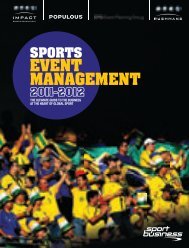4 - FIFA/CIES International University Network
4 - FIFA/CIES International University Network
4 - FIFA/CIES International University Network
You also want an ePaper? Increase the reach of your titles
YUMPU automatically turns print PDFs into web optimized ePapers that Google loves.
MEDIA<br />
Extra-time gave Spain its highest ever TV audience - Getty Images Sport<br />
previous record of 19.4 million, set in the<br />
second round by US-Ghana.<br />
Before the 2010 World Cup, the highest US<br />
audience for a men’s football match was<br />
18.1 million for the US-hosted 1994 World Cup<br />
final between Brazil and Italy.<br />
In host country South Africa, public-service<br />
broadcaster SABC’s average audience for the<br />
tournament was 129 per cent higher than for<br />
2006, when the Bafana Bafana did not qualify.<br />
Free-to-air World Cup audiences in Italy fell<br />
by 24 per cent on 2006, when the Azzurri were<br />
crowned world champions. This time round<br />
the team was eliminated in the group stages.<br />
Audiences for Italy’s group games were down<br />
13 per cent on the 2006 group matches.<br />
France also fell at the first hurdle, crashing<br />
out at the group stage amid dressing room<br />
discontent. Ratings on commercial channel TF1,<br />
which showed 27 matches live, were down<br />
36 per cent on 2006.<br />
In the UK, 57 matches were broadcast freeto-air<br />
on public service-broadcaster the BBC and<br />
commercial broadcaster ITV. BBC1 and ITV1<br />
between them, including audiences on their<br />
respective high-definition channels, attracted an<br />
average of 6.046 million per match, six per cent<br />
down on 2006. HD audiences accounted for<br />
about nine per cent of the total audience.<br />
Huge appetite for internet sport<br />
World Cup broadcasters in both Europe<br />
and the US hailed the 2010 World Cup as a<br />
breakthrough event for sports internet coverage.<br />
Dominic Coles, chief operating officer at the<br />
BBC, described the success of the corporation’s<br />
online audiovisual World Cup content “a turning<br />
point.” He said the medium has now become<br />
“a common part of a user’s daily broadband<br />
experience, especially for the major events.”<br />
The BBC had 38.1 million requests to view<br />
audiovisual content during the tournament,<br />
smashing the previous high of 5.1 million for<br />
Euro 2008. US sports broadcaster ESPN, a<br />
pioneer of online sports coverage, said that the<br />
World Cup had been “truly a breakout event” for<br />
its ESPN3 broadband service.<br />
ESPN3 generated 942 million minutes of<br />
World Cup viewing, with 7.4 million unique<br />
viewers each watching over two hours coverage<br />
on average. The semi-final between Spain<br />
and Germany drew ESPN3’s largest-ever live<br />
audience, 355,000 people per minute.<br />
ITV said that its figures for World Cup<br />
internet coverage illustrated that there was now<br />
“a huge appetite for consuming live action on<br />
the television and online simultaneously.” ITV<br />
attracted two million unique users to its online<br />
coverage during the tournament.<br />
Ericson said that the additional content <strong>FIFA</strong><br />
had made available this time was a factor in the<br />
amount of online viewing.<br />
“We wanted to offer more content than ever<br />
before from the event and we placed the rights<br />
somewhat differently in 2010 so broadcasters<br />
had more flexibility,” he said. He also expects<br />
<strong>FIFA</strong> to deliver even more online content for the<br />
2014 World Cup in Brazil.<br />
Other European broadcasters reported<br />
record numbers for their internet coverage. In<br />
Germany, public-service broadcaster ZDF had<br />
35.9 million unique users on its main website<br />
during the tournament, almost 50 per cent<br />
above normal traffic volumes.<br />
The website zdf.sport.de had 12.7 million<br />
visits, a 381-per-cent increase on its average<br />
monthly traffic. Live match streams drew<br />
an average of 102,000 viewings, peaking at<br />
190,000 for Germany’s victory over Argentina.<br />
In Italy, state broadcaster Rai’s main website,<br />
Rai.it, had record traffic levels during the<br />
tournament, with 116 million page views and an<br />
average of 460,000 unique users daily. The<br />
Rai.tv website, which carries audiovisual<br />
content, had 37 million page views and a daily<br />
average of 233,000 unique users, a 289-per-cent<br />
increase on the same period in 2009.<br />
Rai’s total World Cup coverage, including<br />
match coverage and news, recorded 20 million<br />
page visits, with 250,000 unique users on its<br />
website every day during the competition. Rai’s<br />
peak audience for live streaming was over one<br />
million, for Italy’s group stage defeat to Slovakia.<br />
In France, TF1 had 31 million unique users,<br />
with 10 million videos viewed on its dedicated<br />
site. It drew 334,000 bets, and 40,000<br />
registered users, to its EurosportBET website.<br />
Several World Cup broadcasters were able to<br />
successfully expand the reach of their coverage<br />
through different forms of mobile coverage.<br />
One million unique viewers used ESPN’s<br />
mobile TV, registering 93 million minutes of<br />
viewing, and setting viewing records on major<br />
mobile TV platforms MobiTV and Flo TV. In<br />
total, World Cup content on ESPN’s mobile<br />
offerings generated 98 million visits and<br />
520 million page views. ITV reported 800,000<br />
downloads and two million content views of its<br />
World Cup iPhone app. TF1 recorded 250,000<br />
iPhone apps downloaded.<br />
Eurodata TV Worldwide is the leading provider of sports television<br />
audiences, with access to ratings and programming details for 2,000<br />
channels over five continents. Eurodata TV Worldwide offers a range<br />
of services to help clients successfully market TV programmes and<br />
monitor their broadcasts.<br />
Florent Simon<br />
Eurodata TV Worldwide Sport Manager<br />
Email: fsimon@eurodatatv.com<br />
Tel: +33 171 099 307<br />
SportBusiness <strong>International</strong> • No.160 • 09.10 23

















